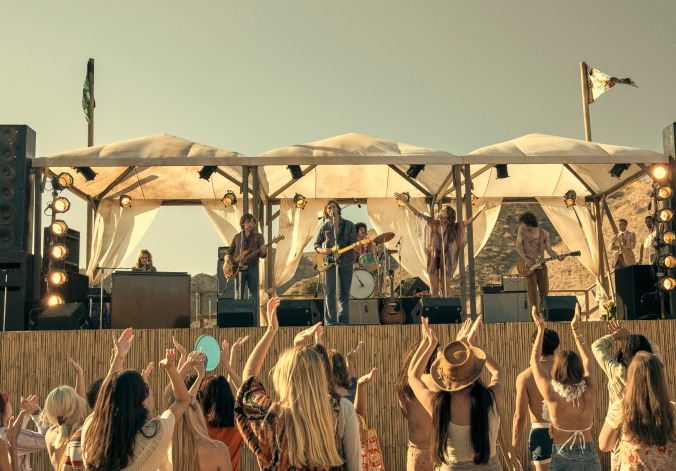Authenticity here doesn’t mean period accuracy. It becomes clear early in listening to Aurora that giving it a true ’70s feel isn’t the focus. The goal seems to be to make these songs hits in today’s market, for Target moms who ordinarily prefer Top 40 Country, but found the Daisy book on an endcap one day, liked it, and have now decided to give this show, and its music, a try. (No disrespect to Target moms! I’m a card-carrying Target mom as well as the worst kind of music storytelling purist, and not sorry about either.) It’s not a bad strategy, from a marketing standpoint, to steer the album’s sound in the direction of that flashy-clean Nashville style. It’s probably what helped to get this show made, that crossover appeal. The Eagles set the template for that whole thing during the Asylum records era in which the show takes place, so in that sense, it is period accurate. Plus, composer Blake Mills has worked across genres himself, so he’s more than equipped for the challenge of making something with broad appeal. That really seems like the purpose of these songs, and he mostly succeeds; they’re all passable.
Daisy Jones & The Six – Regret Me (Official Audio)
What feels inauthentic about Aurora stems directly from this greatest band/greatest album of the 1970s status it strives to uphold. Before even pressing play on the opening track, it’s bound to feel unearned. It feels like the team behind this show and album decided that these characters and their music had to maintain the rock star mythology so doggedly that they were afraid to do anything creatively that might challenge that. No sound could be organically imperfect, no vocal naturally off. The problem is that these songs are so relentless in their campaign to be cool, you can sense every mapped-out moment, every perfectly vetted pitch glide or growl as you listen. Even the grammatical mess of a lyric “go ahead and regret me, but I also will too regret you” seems intended to stand out as wrong, but in a clever way. As such, it all feels deeply impersonal, like they’ve smoothed out the edges and made something dull.
The music choices in the context of the show, the influences that the characters namecheck, and the songs playing in the background all seem to regurgitate what most viewers would accept as cool, too. Only in episode five of the show do the characters let their guard down a little as being less than deeply impressive all the time. This episode seems to intentionally evoke guilty pleasures, as Daisy and Billy swap stories about the first records they bought for themselves. Daisy’s is “Iko Iko” by The Dixie Cups, and Billy’s is “How Much Is That Doggy in the Window,” but he’ll be so mad if she tells anyone. But why? The Beatles were clear about using their parents’ music, by no means cool, as influences on songs like “Your Mother Should Know” and “Honey Pie.” In Daisy Jones, we get Karen and Graham eye-rolling over Graham’s date’s preference for Barry Manilow. They’re all so above it all, and the music feels that way, too. No one’s having a laugh making any of it. It’s all so serious.
The thing is, great records and great movies about music need some point of contrast to work best, something weird or at least different from the rest of its offerings. In music movies, it’s usually another musician character with a distinctly different sound, as with Stark Sands’ character Troy Nelson, the golden boy army man folk singer in Inside Llewyn Davis. We buy Llewyn’s brooding tortured artist all the more with that guy on the scene. In Daisy Jones, we don’t even get a sense of a distinct writing voice between the two main characters.
On great albums, it can be that songs serve as departures, palate cleansers from the Big Ambitious Work, things that are tonally different from everything else we get, like “Never Going Back Again” or “Songbird” on Fleetwood Mac’s Rumours. While Aurora has a few ballads that slow down the tempo, it has nothing like this. Its most out-there instruments, like the glockenspiel, are all over the place in ads and stock YouTube background tracks these days. It’s nothing that people might not like. As an album, it throws a lot at the listener, and in doing so, it lacks subtlety. As mentioned, there are ballads here, but every other song feels like an onslaught of proven cool sounds, like the artists are checking in every few seconds: Do you like me now? How about now? Is this the greatest thing ever?
The Daisy Jones music has to be liked. That’s its whole job. When the artists we love were making their albums that are now canonized, they were hoping to make something great; certainly they believed in their capacity for it. But working musicians, especially at a time when there was a less aggressive pop music machine, knew there were no guarantees. They had people thinking they were weird or stupid for pursuing music at all, and they saw all manner of artists achieve hits that no one could have predicted. They saw other, highly talented peers fail unexpectedly. This show and its soundtrack are out of touch with that reality. It’s doing too much to reject it and portray its subjects as inevitably cool. (They’re never even shown having a bad gig; they fast-track past it!) But maybe the real magic will come when the fledgling artists inspired by Aurora—or the idea of it—make their own music and concoct something decidedly more original and fun.










![HBO teases new Euphoria, Larry David, and much more in 2026 sizzle reel [Updated]](https://img.pastemagazine.com/wp-content/avuploads/2025/12/12100344/MixCollage-12-Dec-2025-09-56-AM-9137.jpg)






























